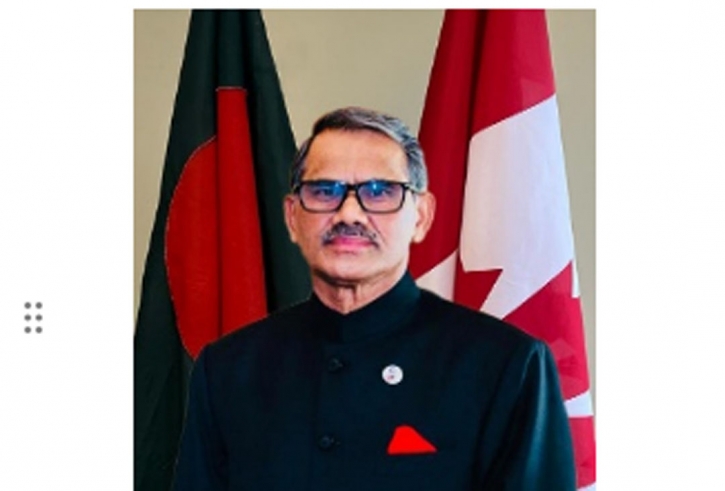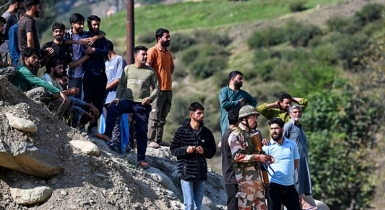
I had a highly productive visit to Regina, the capital of Saskatchewan in Canada from October 30 to November 1 at the invitation of the provincial government. In Regina, I had the pleasure and honour of meeting the Russell Mirasty, Lieutenant Governor of Saskatchewan, Scott Moe, Premier of Saskatchewan, and other ministerial-level dignitaries of the provincial government, the provincial secretary as well as the mayor of Regina, and discussing the entire spectrum of Bangladesh-Canada bilateral relations, with a particular focus on our relations with Saskatchewan.
My visit also extended to Saskatoon, the largest city of the province where I visited the Global Institute for Food Security (GIFS), National Research Council (NRC), Saskatchewan Food Industry Development Centre (Food Centre), Saskatchewan Trade and Export Partnership (STEP), as well as other public and private agencies, and met the top management of these organizations to further our ongoing excellent collaboration in agriculture and food security.
It may be mentioned that Bangladesh and Saskatchewan enjoy excellent bilateral trade relations. Around 70% of Canadian exports to Bangladesh originate from this province. It may be pertinent to add that during my time as high commissioner the overall trade volume between Bangladesh and Canada -- and also Bangladesh’s export to Canada -- are the highest in the last 52 years of our diplomatic relations. We also have excellent collaboration with the GIFS at the University of Saskatchewan in the area of research and development for ensuring food security. The people-to-people ties between Bangladesh and Saskatchewan have been growing in recent years, as more and more Bangladeshi immigrants are choosing this beautiful province as their new home.
At my hour-long meeting and discussion with the premier held at the historic Saskatchewan Legislative Building in Regina, which was also attended by the minister of trade and export development and other high-level officials of the provincial government I found the premier to be very passionate about strengthening and expanding collaboration with Bangladesh, especially in the health care delivery and technical education sectors. Two striking issues the premier himself raised were the recruitment of health care professionals in the province, who are educated in Bangladesh, and collaboration on the transfer of polytechnic students to Saskatchewan Polytechnic. He also assured me of favourably considering my proposal for a separate provincial-level Student Direct Stream (SDS) for Bangladesh since Bangladesh’s request with the federal government for its inclusion in the SDS is awaiting a final decision in February 2021.
The premier also agreed to a provincial-level trade delegation to Bangladesh, to be led either by him or the minister of trade and export development, comprising provincial policy-makers and business leaders, after the next general election. During that visit the delegation would like to sign some MoU between Bangladesh and the province for collaboration in mutually beneficial sectors. It may be mentioned that another federal-level trade delegation, led by Paul Thoppil, prime minister of Canada's Indo-Pacific Trade Representative, is also scheduled to visit in March/April 2023. In addition, our discussion also included organizing a Business Summit in Saskatchewan jointly by the Saskatchewan Chamber of Commerce and the Federation of Bangladesh Chambers of Commerce and Industries (FBCCI) in the province to promote trade and investment in Bangladesh, setting up a Canola Crushing Plant in Bangladesh by Canadian businesses as well as effective implementation of the existing MoU between the Global Institute for Food Security (GIFS) and Bangladesh Agricultural Research Council (BARC).
In a separate joint meeting with the minister of advanced education, the minister of health, and the minister of mental health and addictions, we had a more detailed
conversation on collaboration in health care and technical education as a follow-up to my discussion with the premier.
In line with my discussion with the Honourable Premier, the Honourable Minister of Health agreed to recruit doctors, nurses, and other medical professionals from Bangladesh directly under their Saskatchewan Immigrant Nominee Program (SINP). Moreover, they expressed interest in recruiting existing medical professionals from Bangladesh who are already living in Canada but working in non-medical jobs due to a lack of recognition of their degree from Bangladesh by concerned Canadian authorities. We also discussed the recruitment of Bangladeshi-trained nurses and nursing students in the Saskatchewan province as Personal Support Workers (PSW) just after finishing a language and PSW related orientation programmes.
Additionally, we agreed to initiate discussions for a bridge program for PSW in which prospective PSW would get half of their training in Bangladesh and the remaining part in Saskatchewan. In this context, it may be mentioned that we are working on a separate bridge program for Program with the Ontario-based National Association of Career Colleges (NACC) and the National Skills Development Authority (NSDA) in Bangladesh for training and recruitment of PSW in Canada.
The minister of advanced education agreed to initiate the process to connect Saskatchewan Polytechnic with the polytechnic institutes in Bangladesh under the Bangladesh Technical Education Board in congruence with my earlier discussion with the premier. Once this collaboration is formalized under an MoU, students from polytechnic institutions in Bangladesh will be able to receive a part of their education at Saskatchewan Polytechnic, including language training, after completing certain credits in Bangladesh, and they will be recruited after finishing their education.
Trained graduates from this joint program will be able to contribute to both Canada's and Bangladesh's technical sectors. I also told him to develop policies to increase the number of undergraduate-level students in addition to postgraduate students in universities in the province. Soon we would work together to conclude a potential MoU in this regard between the prospective universities of Bangladesh and Saskatchewan.
In the coming days, we from the high commission would be working with the government of Saskatchewan to formalize these ideas and proposals. I believe that once these initiatives are fully formalized, it would be a win-win situation for both Bangladesh and Saskatchewan, and the existing and growing relations between Bangladesh and Saskatchewan Province would further expand and deepen.
Lastly, I would recommend our Bangladeshi nationals to apply under the Saskatchewan Immigrant Nominee Program (SINP) if they wish to migrate to Canada as it would be easier to get accepted by a province which welcomes Bangladeshis with open arms.
The writer is High Commissioner of Bangladesh in Canada





































